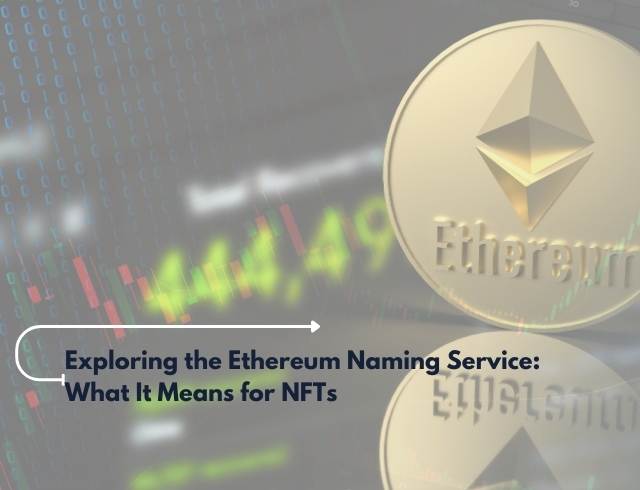

The Ethereum Naming Service (ENS) is a revolutionary tool that enhances the functionality and accessibility of blockchain-based services. By translating complex Ethereum addresses into user-friendly names, ENS simplifies interactions with the Ethereum network. This service has far-reaching implications for various applications, including Non-Fungible Tokens (NFTs). In this article, we’ll delve into what ENS is, how it works, and its impact on the world of NFTs.
What is the Ethereum Naming Service (ENS)?
The Ethereum Naming Service (ENS) is a decentralized domain name system built on the Ethereum blockchain. It allows users to register human-readable names that can be associated with Ethereum addresses, smart contracts, and other resources. Essentially, ENS replaces long, cumbersome addresses with simple, memorable names, much like traditional domain names on the web.
For example, instead of using an address like `0x1234567890abcdef1234567890abcdef12345678`, users can use a more user-friendly name like `alice.eth`. This system streamlines transactions and interactions on the Ethereum network by making addresses easier to remember and share.
How ENS Works
ENS operates through a combination of smart contracts and a decentralized registry. Here’s a high-level overview of how it works:
- Registration: Users can register a domain name on the ENS platform, similar to how one would register a domain name on the internet. The registration process involves bidding for the name, paying registration fees, and maintaining ownership through periodic renewals.
- Resolution: ENS maps human-readable names to Ethereum addresses and other resources. When a user inputs an ENS name, the system resolves it to the corresponding Ethereum address or contract, facilitating seamless transactions and interactions.
- Management: ENS domains are managed through smart contracts, which handle ownership, resolution, and updates. Users can configure their ENS names to point to various resources, including wallet addresses, websites, and decentralized applications (dApps).
The Impact of ENS on NFTs
The integration of ENS with NFTs brings several benefits and improvements to the NFT ecosystem:
- Simplified Transactions: ENS makes buying, selling, and trading NFTs easier for users. Instead of dealing with lengthy and complex Ethereum addresses, users can use ENS names to simplify transactions. For example, an NFT seller can provide a name like `mycollection.eth` instead of a cryptic address, streamlining the process for buyers.
- Enhanced User Experience: ENS improves the overall user experience in the NFT space. By replacing long addresses with intuitive names, ENS reduces the chances of errors and makes interacting with NFTs more accessible, especially for newcomers.
- Increased Discoverability: ENS names can enhance the discoverability of NFT collections and creators. By using memorable names, NFT projects can improve their visibility and make it easier for users to find and engage with their work. For instance, an artist could use a name like `artisticgenius.eth` to brand their NFT collection.
- Cross-Platform Integration: ENS names can be used across various platforms and applications, facilitating a cohesive experience. NFT platforms and marketplaces that support ENS can integrate these names, allowing users to access their collections and profiles seamlessly across different services.
- Enhanced Security: ENS reduces the risk of transaction errors by minimizing the likelihood of misentering complex addresses. This added layer of security can prevent mistakes that could result in lost or misdirected NFT assets.
Future Prospects for ENS and NFTs
As the NFT space continues to evolve, the role of ENS is likely to grow. Future developments may include enhanced integration with NFT platforms, support for additional blockchain networks, and more sophisticated features for managing and using ENS names.
The continued adoption of ENS can drive greater standardization and interoperability in the NFT market, making it easier for users to navigate and engage with digital assets. With ongoing advancements and growing support, ENS has the potential to become a cornerstone of the NFT ecosystem, further bridging the gap between the digital and physical worlds.
Conclusion: Embracing ENS in the NFT World
The Ethereum Naming Service represents a significant advancement in the usability and accessibility of blockchain technology. ENS enhances the experience for NFT creators, collectors, and traders by providing user-friendly names for Ethereum addresses and resources. As the NFT market continues to expand, integrating ENS into NFT platforms and projects will likely play a crucial role in shaping the future of digital assets.